Business in Bahrain. Bahraini Economy
Foreign Trade of Bahrain, Logistics. Business in Manama. Bin Ahmed Kanoo
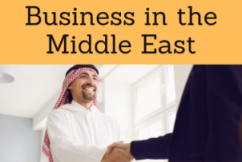
Bahrain: The freest economy in MENA region.
The Aluminum industry is vital for Bahrain (13% of total exports)
Main economic activity of Manama is related to the financial services, near 200 financial institutions and banks generate 27% of GDP of Bahrain (80% of the active population works in the financial sector)
- Introduction to the Kingdom of Bahrain (Middle East)
- Doing Business in Manama
- Bahraini economy
- Main economic sectors in Bahrain
- Economic Vision 2030
- Foreign Trade of Bahrain
- Bahraini Customs
- Business Opportunities in Bahrain
- Financial and professional services
- Logistics
- Manufacturing
- Transport and Logistics
- Information, communications, and technology
- Real Estate
- Bahrain Economic Development Board (EDB)
- Case Study:
- Yusuf Bin Ahmed Kanoo Group
- Mumtalakat
- Access to the Bahraini market
- Business Plan for Bahrain
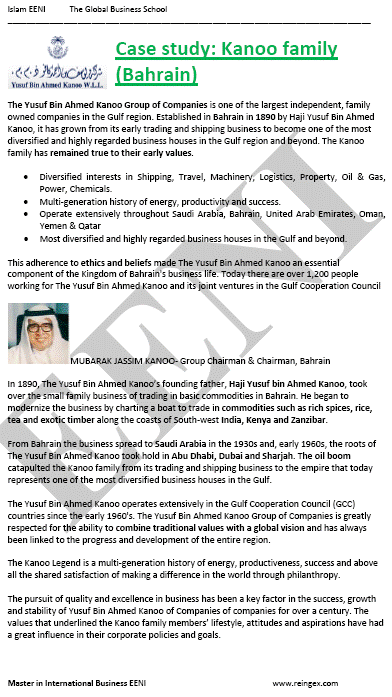

The objectives of the subject “Foreign Trade, Logistics and Business in Bahrain” are:
- To analyze the Bahraini Economy, Logistics and Foreign Trade
- To conduct research on business opportunities in Bahrain
- To explore the Bahraini trade relations with the student's country
- To learn about Bahraini Trade Agreements
- To examine the profile of Bahraini businesspeople and companies
- To develop a business plan for the Bahraini Market

The Subject “Foreign Trade, Logistics and Business in Bahrain” is included within the curriculum of the following academic programs at EENI Global Business School:

Masters: International Business, Foreign Trade.

Masters adapted to  Bahraini Students.
Bahraini Students.
Languages:  or
or  Bahrein
Bahrein  Bahrein.
Bahrein.
- Subject Credits “Doing Business in Bahrain”: 2

International Trade, Logistics and Business in Bahrain

Preferential Access and Trade Agreements of Bahrain
- Bahrain and the Arab Economic Area
-
Gulf Cooperation Council
- European Union-Bahrain (GCC) Agreement
- India-Bahrain (GCC) Agreement
- Australia-GCC Agreement
- Trade Agreements with China, Singapore, South Korea, EFTA, New Zealand, Thailand, MERCOSUR
- U.S.-Bahrain Agreement
- Trade Preferential System (TPS-OIC)
- Greater Arab Free Trade Area (GAFTA)

- World Trade Organization (WTO)
- Agreement on Trade in Services (GATS)
- Agreement on Sanitary Measures
- Agreement on Technical Barriers to Trade
- Agreement on Preshipment Inspection
- Agreement on Safeguards
- Trade Facilitation Agreement
- World Customs Organization (WCO)
- Kyoto Convention
- BIC
- Chicago Convention (ICAO)
- International Maritime Organization
- Access to the China-Pakistan Corridor
- Access to the Kyrgyzstan-Iran Corridor (KTAI-ECO)

- Arab League
- Summit of South American-Arab Countries (Bahrain)
- Asia-Middle East Dialogue (Bahrain)
- Islamic Development Bank
- Economic Commission for Western Asia (ESCWA)
- Organization of Islamic Cooperation (OIC)
- Committee for Economic Cooperation
- Islamic Chamber of Commerce
- Islamic Centre for Development of Trade
- Economic Centre for Islamic Countries
- Afro-Arab Cooperation
- Arab Bank for Africa (BADEA)
- Arab Gulf Programme
- Arab Trade Financing Programme
- Arab Development Funds

- Asia Cooperation Dialogue
- United Nations
- World Bank
- World Trade Organization (WTO)
- International Monetary Fund
- ...
The Kingdom of Bahrain.
- Bahrain is an independent Emirate with a traditional Monarchy
- System of Government: hereditary constitutional monarchy
- His Majesty King Hamad bin Isa Al Khalifa
- Arab is the official language of Bahrain
- Bahraini Population
- 1.2 million people with 90% of urban population (90%)
- 50% of its residents are expatriates
- Bahrain has the highest literacy rate in the Gulf Cooperation Council region
- Bahrain is the country with a smaller population of GCC
- Capital of Bahrain: Manama (27% of the Bahraini GDP)
- Al Muharraq is the second most populous city of the Kingdom of Bahrain
- Borders of Bahrain: Qatar and Saudi Arabia.
- Iran (by sea)
- Abolition of Slavery in Bahrain: 1937
- Independence of Bahrain from the United Kingdom: 1971
Religion in Bahrain.
- Shiite Islam (70% of the population)
- Islamic Jurisprudence (Sharia) is one of the main legislative sources
- School (Fiqh): Maliki
- There is no official religion in the Kingdom of Bahrain (freedom of belief)
- 15% of the population of Bahrain is Christian and 10% Hindu
Bahrain belongs to the Arab Economic Area.
Manama is the capital of Bahrain and the economic and financial centre.
- Several multinational enterprises are in Manama
- Influence of religion on financial systems
Bahraini Economy
Bahrain is the freest economy in MENA region (Middle East and North Africa), is the thirteenth position in the World.
Some of the best enterprises in the World such as American Express, BNP Paribas, Kraft or DHL have been selected Bahrain as a strategic distribution location for regional operations
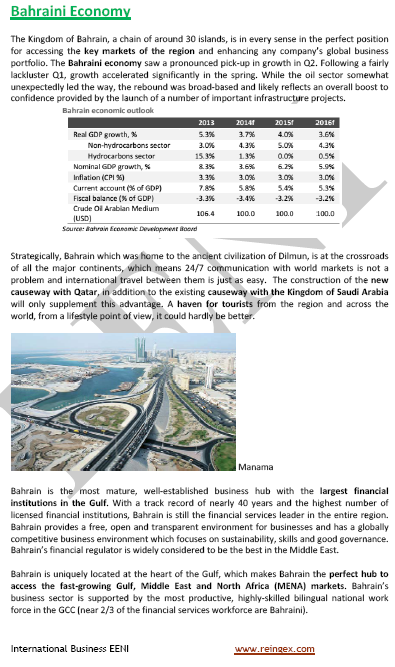

Bahraini Foreign Trade
- Top export markets of Bahrain are Saudi Arabia, the United States, the Emirates, and South Korea
- Top suppliers of Bahrain are Saudi Arabia, Japan, Germany, and the United States
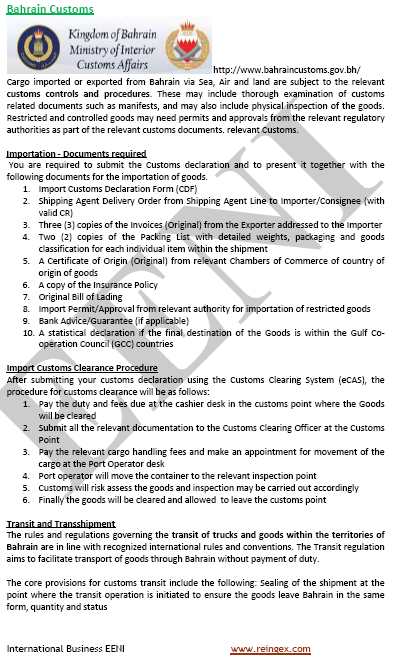
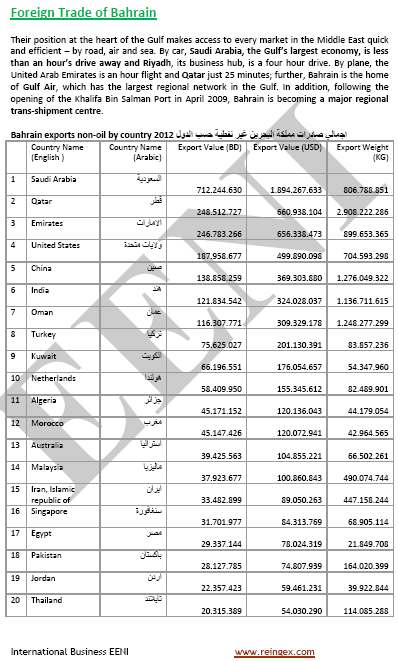
(c) EENI Global Business School (1995-2025)
Top of this page









 WhatsApp
WhatsApp